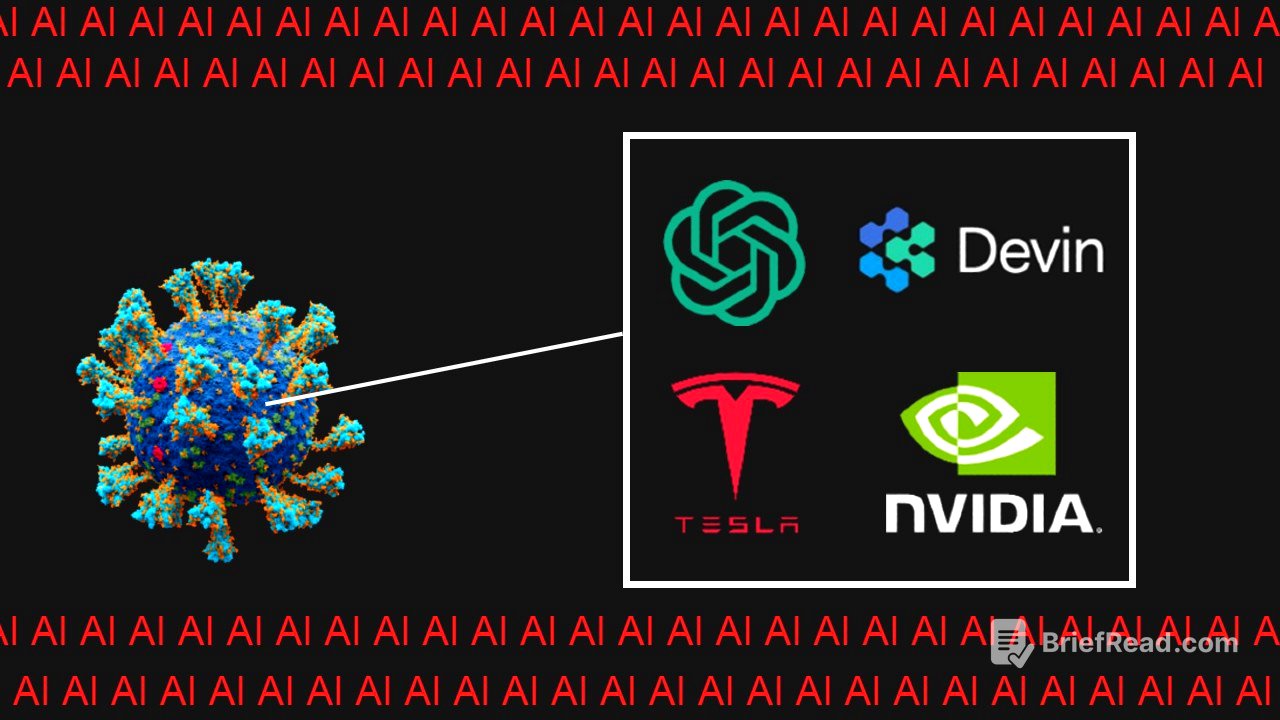TLDR;
The video discusses the current AI hype, its potential impact, and how to make informed decisions in a rapidly changing technological landscape. It covers the history of AI development, the motivations behind corporate investment, and the potential for both progress and disappointment. The video emphasizes the importance of understanding human nature and historical context when evaluating technological advancements.
- AI hype is a powerful marketing tool that can lead to inflated valuations and potentially misleading claims.
- Companies invest in AI to avoid being disrupted, even if immediate profits are not guaranteed.
- The rate of AI improvement may slow down as it reaches more complex challenges.
- When making life decisions, consider the potential for regret and the broader implications of technological advancements.
The Mind Virus [0:00]
The video starts by addressing the current "virus" of hype surrounding AI, characterized by exaggerated claims and a rush to embrace the technology. The author acknowledges anxieties about AI's impact but emphasizes the importance of maintaining a broad perspective, aligning his views with leading AI researchers. He aims to provide historical context and facts to inform conclusions about the tech job market and significant life decisions. The core argument is that while technology evolves, human nature remains constant.
OpenAI [1:52]
The discussion begins with the release of ChatGPT in 2022, which made it clear that it was a revolutionary technology but its progress would be gradual. The author expresses skepticism about the hype surrounding OpenAI, questioning their ethics, citing instances of illegal non-disclosure agreements, a culture of lying, and the questionable use of data to train AI models. Despite facing criticism for these views, recent revelations have started to validate his concerns about OpenAI's practices.
Why are companies investing in AI? [3:27]
The video explores the reasons behind massive corporate investments in AI, suggesting that companies are primarily motivated by the fear of being left behind. Using a thought experiment, the author explains that for companies like Google, investing in AI is a strategic move to protect their monopoly, regardless of whether the investment immediately pays off. The primary concern is to avoid a "Microsoft moment," where a company misses out on a major technological shift, as Microsoft did with smartphones.
AI is not profitable (yet) [5:29]
The author points out that currently, NVIDIA is the primary beneficiary of the AI boom, profiting from selling the hardware (shovels) needed for AI development. It remains unproven whether these tools will actually "find gold." The video draws parallels to the hiring frenzy of 2021, where companies overhired in anticipation of a new technological era, only to later lay off thousands when those expectations were not met.
Hype is a Marketing Tool [6:31]
Hype is identified as a powerful marketing tool, exemplified by companies like Devon AI and Tesla. Despite initial excitement, Devon AI was later found to be overrated, with its claims exaggerated. Tesla, while successful, has also been known to overstate the capabilities of its full self-driving software. The video highlights that companies often blur the lines between hype and fraud to increase their valuation and attract talent, using inflated equity offers as a recruitment tool.
How fast will AI improve? [10:21]
The video discusses the factors influencing the rate of improvement in AI, including better chips, high-quality data, and research breakthroughs. However, it also raises the possibility that current computing paradigms may be fundamentally incompatible with achieving human-level intelligence, suggesting that a paradigm shift, such as quantum computing, might be necessary. The author notes that the rate of improvement from GPT-3.5 to GPT-4.0 has been slow, and that further advancements may become increasingly difficult, drawing an analogy to the challenges of improving system availability in distributed systems.
How to make life decisions? [14:12]
The video offers a framework for making tough decisions in the face of technological uncertainty. It advises against making drastic career or educational changes based solely on predictions of automation. The author emphasizes the importance of considering the potential for regret and the broader implications of technological advancements. He argues that skills like programming and logical thinking remain valuable, even in an automated world, and that a solid education in math, physics, and programming is still beneficial. The video concludes by highlighting the fundamental differences between human brains and AI, suggesting that AI is unlikely to fully replicate human intelligence and creativity.









